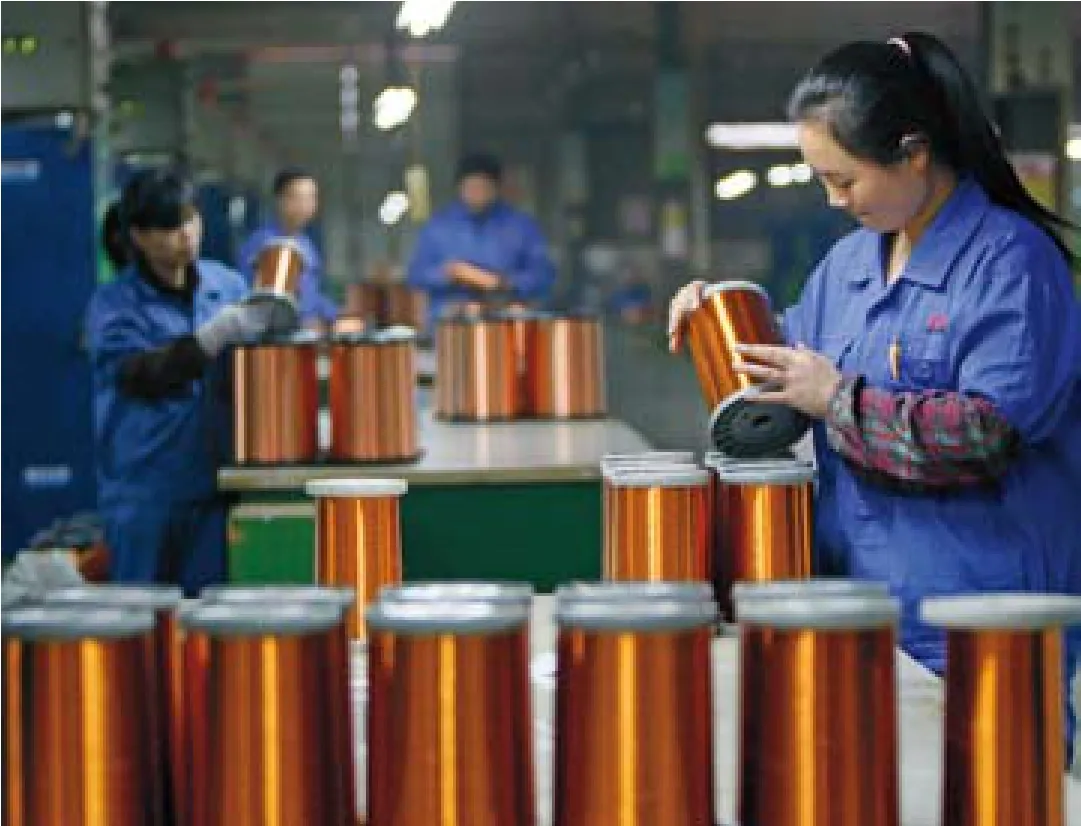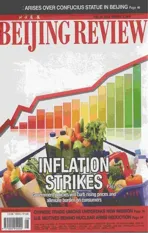How Inflation Is Stealing Profits
2011-11-17ByLANXINZHEN
By LAN XINZHEN
How Inflation Is Stealing Profits
By LAN XINZHEN
Growth in product prices is far below that of raw material prices and other costs,leading to a decline in profits for Chinese enterprises
Erguotouis a favorite among spirits lovers in Beijing because of its low price and interesting taste. But as prices race skyward, its producers are coming under pressure.
“Costs of grain, water, electricity and transportation have increased more than 20 percent since last year, but the prices of our products have remained the same. This has led to the drastic cut in our pro fi ts,” said Tian Xiuping, sales manager of Beijing Red Star Co. Ltd., which produces the Red Star branderguotou.
Sorghum and wheat are the main ingredients forerguotou. According to figures released by the Beijing Bureau of Statistics,in January 2011 wholesale prices of sorghum and wheat increased by 14 percent and 12.8 percent year on year, respectively.
The company, however, has to absorb the increases instead of passing them on to consumers since competition in the spirits market is fi erce, Tian said. Particularly, for a low-end spirits likeerguotou, raising unit prices would mean a loss in market share.
According to figures released by the National Bureau of Statistics, in January 2011 the producer price index (PPI) for manufactured goods rose 6.6 percent compared with the same period last year, while the purchasing prices for industrial producers rose 9.7 percent year on year. In all, the growth of prices of fi nished products is far below that of raw materials.
Different price growth rates for fi nished products and raw materials have also explained why Chinese people feel that prices of farm produce, food and bulk commodities of resources have increased much faster than those of such consumer goods as electronic appliances, clothes and low-end spirits. In industries with fi erce competition, only a small part of price hikes from raw materials can be passed on to the prices of fi nished products.
Growth of purchasing prices for industrial producers is much higher than that of wholesale prices of products, which has squeezed pro fi ts out of producers and brought business difficulties to some enterprises.According to a report released by the accounting fi rm Grant Thornton China, in the short term price hikes of bulk commodities and human resources will be a new challenge for enterprises. Affected by the above factors,57 percent of enterprises are going to raise product prices in 2011.

LOWER PROFITS,HIGHER WAGES:A Zhejiang enterprise’s employees work on a production line. During times of inflation, many enterprises suffer profit declines as their employees expect higher wages
However, not all enterprises are negatively affected by the high price levels. A report released by Haitong Securities Co. Ltd.says as in fl ation occurs and the market price level increases, inventory products can be sold at higher prices and nominal corporate profits will increase. Their debt burden can also be alleviated. Therefore price hikes will have a more positive influence on companies with higher inventories, but only a few companies will enjoy this bene fi t. Companies that require large amounts of raw materials to maintain operations will feel the heat from price hikes of such materials or imported raw materials due to global in fl ation.
As for different industries, in fl ation will not significantly affect the ferrous metal,non-ferrous metal, mining and dressing of non-metal minerals and special equipment industries. To resource products such as coal,oil and natural gas that are in the upper and middle streams of industrial chains, since they have strong monopoly power to some extent and their products are in higher demand among enterprises at the lower ends of the production chain, their pricing power is comparatively strong.
Industries involved in high-end spirits,wines, and food and tobacco processing are capable of passing on costs to the consumers,but since competition is quite fi erce, product price hikes have been lower than the growth of costs.
The Haitong report sums up that raw material industries can bene fi t from the high prices, the processing industries and general manufacturing industries will widely suffer negative influences from the high prices,while some hi-tech industries will almost not be affected at all.
Zeng Zhaoxiong, General Manager of Shenzhen Cowin Investment Management Co. Ltd., claims to have an all-round way to consider the in fl uence of in fl ation upon corporate pro fi ts. Long-term malignant in fl ation will damage most enterprises’ profits, but moderate in fl ation will increase the pro fi tability of some. The key point is the gap between the consumer price index (CPI) and PPI. If PPI is higher than CPI, only raw material companies will reap pro fi ts. On the contrary,companies capable of passing on price hikes can increase their pro fi t level during moderate in fl ation.
Zeng thinks without additional factors contributing to price hikes, domestic in fl ation will decline in the second half of 2011. The present inflation level won’t last long, but because of the increased production costs,in fl ation will exist, Zeng said.
When regarding the impact of high prices upon corporate profits, Zeng said, attention must be paid to another impact—employees’reasonable expectations of wages will increase. During in fl ation, employees will expect more wages to make up for the decreases in their standard of living or the real losses of their assets caused by in fl ation.
